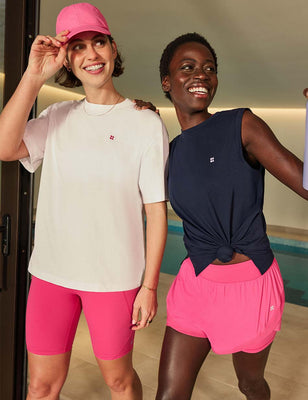We all know that exercise is ‘good for us’, making us happier and healthier. Many people also know that it reduces the risk of developing a plethora of illnesses. But most of us don’t really understand why, nor do we realise quite how profound the impact of exercise is on our immune system.
The Covid-19 pandemic brought discussion of t-cells and antibodies into everyday life, increasing interest in what impacts our immune system, and how different health outcomes can be.
So we’ve done a deep dive on the benefits of exercise; how it reduces inflammation, reduces infection, improves recovery, improves vaccine effectiveness and mitigates age-related decline in your immune system.

Put simply, if exercise were a pill, it would be the cheapest and most effective drug ever invented.
First up, how exactly does exercise impact your immune system?
-
Enhanced immunosurveillance - some cells, such as NK (Natural Killer) cells, which deal with viral infections, can increase tenfold after exercise
-
Reduced respiratory illness risk - with moderate exercise, the risk of upper respiratory tract infections (cold, flu etc) reduces by 40-50%
-
Reduced inflammation - persistent inflammation is linked with multiple disorders and diseases, and is materially reduced by exercise, though this is more effective when linked to weight loss
-
Immunosenescence influence - exercise significantly mitigates the impact of ageing on the immune system
Exercise primes immune cells to look for infections
Exercise augments something called ‘immuno-serveillance’, basically the body’s immune cells looking for pathogens and disease cells. During a bout of exercise, white blood cells leave our tissues and move into the bloodstream, as heart rate increases and blood is more forcefully pumped around the body. These cells migrate into other areas, such as the lungs or gut, which might need more immune help during exercise. By stressing your body in exercise, you are priming immune cells to look for infections, and move to tissues such as muscles that have worked hard and need repairing.
Exercise also sends a message to our body to make new white blood cells, so regular exercise keeps these critical cells young and fresh.
Exercise reduces respiratory illness risk by 40-50%
There is now a large body of clinical trials and epidemiological studies that consistently show that regular, moderate physical exercise may reduce the risk of upper respiratory tract infections (URTI - or colds, flu and the like) by 40-50%, and in particular mitigate the risk of getting a severe form of one.
There is an inverse relationship whereby as exercise workload increases, so risk of an URTI decreases.
But this is a J-curve, and over exercising actually increases URTI risk. The relationship between exercise and immunity is a complicated one, and it can be a double edged sword if you exercise too much. It is quite hard to hit this excessive exercise workload level, but overtraining is something to be careful about.
Overtraining can impair the immune system
There is a tipping point where the level of exercise becomes too much for the body. This is most commonly seen in elite athletes training for competition, where the intense training combines with psychological stress to increase the risk of illness. What appears to happen is that overtraining creates a window of 48-72 hours after high intensity or exhaustive levels of exercise where the immune system is compromised by fatigue and stress hormones, making the body more susceptible to viral infection.
It is important to note that the threshold for overtraining starting to increase risk of infection is very high - generally with bouts of exercise over 90 minutes, exercising without rest for two weeks, or training more than once a day. This is predominantly a risk for professional athletes, and a few sensible steps will ensure that your level of exercise improves your immunity, rather than impairs it;
-
Take rest days - if you train every date, there is a cumulative impact on the immune system. Rest and recovery is really important. Avoid training every day for over two weeks. If you do a very high intensity workout, try and give your body 48 hours to recover before doing another one
-
Don’t ramp up training too fast - the risks are highest when there is a large increase in exercise intensity or duration, so don’t ramp up too quickly. Typically aim to increase your training loan by no more than 10% a week
-
Be careful with long duration exercise - persistent exercise over 90 minutes minutes is where the risks start to build, so long duration exercise training such as marathons need appropriate rest between sessions
-
Avoid intense exercise if you're not feeling healthy - avoid intensive training when you’re ill or have early symptoms of an illness, as exercise can make it more severe or prolonged. This is because your body is already working hard to fight an infection, so additional stress from intense exercise is unhelpful. See our blog Should We Still Exercise When We're Ill.
Overall, as long as exercise is sensibly calibrated you’ll be fine, but just be mindful that there is a tipping point, and monitor signs of overtraining and illness if you are on an intense programme.

Exercise triggers an anti-inflammatory response in your body
Persistent increases in inflammation in the body is linked with numerous diseases and conditions, from cardiovascular disease to cancer, and depression to dementia. It is a very long list.
Exercise and training triggers inflammation in muscle tissue, as a result of damage to muscle fibres. But this temporary spike in inflammation is good for you, as it sends a signal to trigger muscle repair and growth. That challenge and stress to the muscles in your body triggers ‘free radicals’ and the release of a hormone called interleukin-6 (IL6) into the blood, which helps slow the shrinking of the thymus (which happens with age), allowing it to make new T cells which are critical to fighting infection, immune disorders and cancer.

Weight, Exercise and Immunity
In general at The Sports Edit we avoid talking about exercise as a tool for weight loss, as its benefits go far beyond this. However, in the case of inflammation, there is a large amount of evidence that shows that the anti-inflammatory effect of exercise is multiplied if body fat is reduced. This is because obesity induces a constant state of low-grade inflammation - the kind you don’t want. Exercise alone can’t mitigate this. Weight loss is more effective at reducing low-grade inflammation, and it appears that the anti-inflammatory benefits of exercise are multiplied when combined with weight loss.
A healthy body mass is a cornerstone of strong immunity. Too much body fat in parts of the body, especially the belly, contributes to low-grade inflammation.
Overall there is growing evidence that exercise has an anti-inflammatory influence through multiple pathways, well beyond what we have space to cover here and this is a critical aspect of its beneficial impact on your immune system.
Exercise reduces age related immune system decline
We learnt during covid how much more severe a virus can be for older people. This isn’t specific to covid; in general the immune system deteriorates with age, increasing how frequently and severely people become ill (called immunosenescence).
Regular exercise is capable of improving regulation of the immune system and delaying the onset of immunosenescence. Evidence shows that exercise is associated with the following in older people;
-
Better vaccination response
-
Fewer exhausted T-cells, and better capacity to generate new T-cells
-
Lower inflammation
-
More NK (Natural Killer) cell cytotoxic activity - this plays a key role in defence against viral infections and cancer

What is the best form of exercise to improve immunity?
The most important point is that your exercise is regular and moderate, and both aerobic and anaerobic. So whilst walking, running and hiking are good, it is when combined with high-intensity activities, like HIIT or an intense weights session, that you get the biggest benefits. A varied, well-rounded exercise regime is the secret to the strongest immunity.
Overall, there is now ample evidence to confidently say that regular, moderate exercise will boost your immune system in multiple ways, reducing risk of illness and disease, and improve your chances of living longer.
Sources:
The compelling link between physical activity and the body's defense system, David C.Niemana and Laurel M.Wentzb
Meditation or exercise for preventing acute respiratory infection, Bruce Barrett
IMMUNITY: The Science of Staying Well, Dr Jenna Macciochi































































